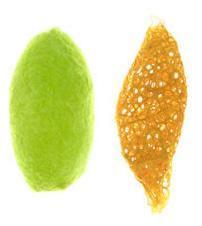Silk, which consists of the proteins sericin and fibroin, has many properties that make it useful for a number of applications. Because it is made from protein, it is highly biocompatible and non-toxic, and retains moisture well. It is extremely good at blocking UV rays, which can age skin and cause skin cancer. It is biodegradable, tasteless and odorless. It is good at absorbing oils and fats, and it can’t be easily digested. People have been refining techniques for domesticating silkworms for thousands of years in order to harvest the white silk of their cocoons. The practice of farming silk in this manner is referred to as sericulture. However, in nature, there are also a number of moths, or wild silkworms, that spin cocoons from threads referred to as wild silk. A kind of wild silkworm found in Indonesia called curricula is known for producing a beautiful golden-colored cocoon. Wild silkworm cocoons almost completely block UV radiation. Silkworm pupae are extremely sensitive to UV radiation, and the slightest amount will prevent them from developing into healthy adults. Wild silkworms have the ability to block out such a high percentage of UV because they need to be able to survive in nature, while domesticated silkworms have become used to a much more controlled environment.
- Defense/Stability:
- Humidification
Silk and its constituent proteins, fibrin and ceresin, have been used in cosmetics, as well as diet and health foods. It can be converted to gel or powder form while retaining its biocompatibility, ability to cut UV rays and absorb fat. These features make it attractive for use in cosmetics such as foundation and skin creams. Health food manufacturers use it for its fat absorption properties and indigestibility. It is odorless and tasteless, so it can be added to food products without affecting the flavor.
- Silk is used in cosmetics, and health and diet foods.
Silk, like many natural materials, is non-toxic, and therefore safer for use in children’s toys than chemically produced petroleum products, like plastics. Some people are allergic to the chemicals in conventional wallpapers, and silk-based wallpaper could provide a hypoallergenic alternative. Silk-based products that have outlived their usefulness can be recycled and reprocessed many times into new products. Silk is biodegradable, and therefore ecologically friendly even when finally thrown away. If curricula could be farmed, they would provide an abundant source of naturally gold-colored thread for use in clothing.


















